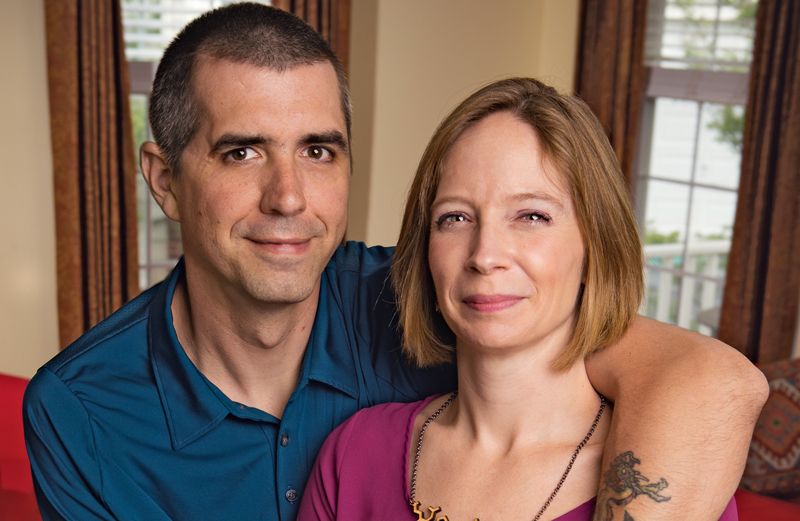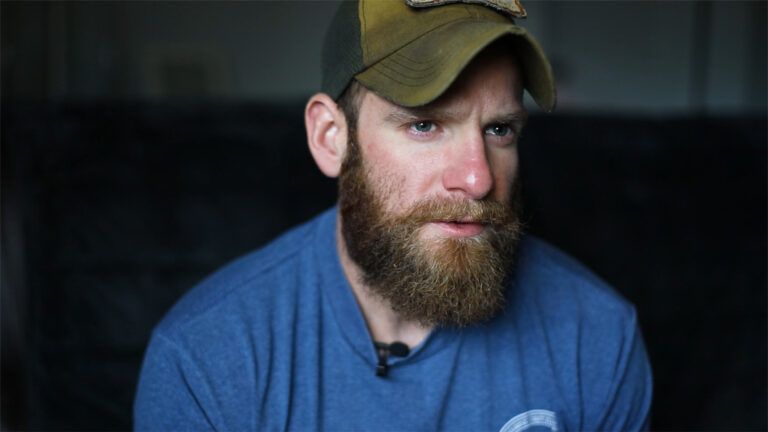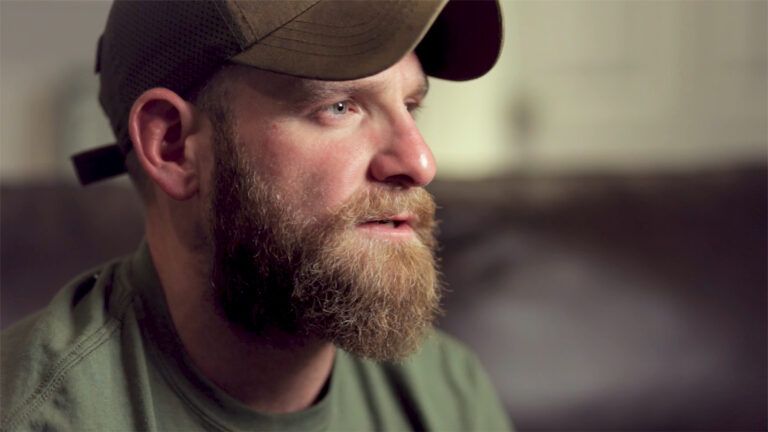Sitting on the deck, dinner cooking on the grill. It felt good to kick back with my husband. A normal life, after serving together in Iraq in the Army’s 101st Airborne Division. And then Brian asked a question that was nearly as jarring as an incoming mortar round.
“Are you going to leave me? Sometimes I feel like you’ve been trying to fix me. And now that I’m getting better, I worry you’ll move on.”
It was true that Brian had made almost miraculous progress in the five years since he’d suffered a massive head injury in a bomb attack. He’d–we’d–struggled through some hard times. But leave him? Now that he was so much better? Would I do that? Why would Brian think that?
I met his gaze, those penetrating brown eyes, practically the first thing I’d ever noticed about him. “No, honey, of course I’m not going to leave you.”
Yet something deep inside me clenched. For all our married life I’d been Brian’s caregiver. I’d married him so I could take care of him. Certainly there were things he still struggled with–planning a meal, getting the dog to the vet. Crowds or fireworks could freak him out. His emotions could be mercurial.
But he’d started working at a nonprofit veterans organization. He was increasingly independent, stable, the competent soldier I’d fallen for.
Brian’s question haunted me over the following days. His even asking it showed he understood that the basic dynamic between us was shifting. If the center of our life was Brian’s recovery, what happened once that recovery was achieved? The possible answers scared me.
Finally I made an appointment with a therapist. “You’re so close to Brian,” Dr. Judith said. “You need to get away, somewhere where you can think and reflect. That’s when you’ll find the answer you’re looking for.”
A few weeks later I was headed to Key West, Florida, on a sun-kissed afternoon, a ribbon of highway stretching over the sparkling ocean. My first vacation away from Brian. I pulled over at a rest stop. Thought about calling him. No. He’s fine.
Seagulls hung lazily in the air. When was the last time I’d had nothing to do? No responsibilities? It was hard to remember. Brian and I had met at a remote outpost up north, near the Syrian border. There were eight of us, living rough.
I was a linguist, my job to intercept enemy communication using a scanner powered by our vehicle’s battery. Other soldiers watched for enemy movement. I had to stay focused. But it wasn’t easy, not when their sergeant, Brian McGough, was around.
He was handsome–6 feet 6 inches, a foot taller than me–a chiseled jaw and those brown eyes that seemed to take in everything. A natural leader. We hit it off immediately. “Fix me some eggs, sleazeball,” he’d say. “Make me some coffee, dirtbag,” I’d answer. Flirting, Army style.
We talked about everything. Music. Politics. He’d enlisted after dropping out of college. He was on his third deployment in four years. I’d joined the Army in 2000, after a stint fund-raising for a nonprofit. I liked the idea of being a linguist, the chance to learn a language for free.
I was assigned by chance to study Arabic. Then came 9/11.
One night I told Brian how much I liked him. How I wished we could be more than friends. He squeezed my hand. “There’s plenty of time when we get home,” he said. And that was that.
It was October 2003–in four months I’d be going back to the States–when I heard the news about Brian. I was at the base in Tal Afar getting resupplied when I ran into another sergeant. “Did you hear about the attack?” he asked. “McGough was in it. They don’t think he’s going to make it.”
I felt a sick knot in my chest. It stayed with me for days. Every morning I’d trudge over to the bunker his men lived in. What had they heard? Brian had taken shrapnel in his head.
He had brain surgery in Baghdad; it didn’t look good. He was evacuated to Germany; don’t expect much. He was sent to Walter Reed; he was stable. I tried not to fixate on him. I had my job to do. I’d probably never see Brian again. My heart ached at the thought.
The day our unit came home I called Brian. I could barely believe it when he answered. He’d been released from Walter Reed. An hour later he was at my house. Those strong, comforting arms holding me tight. I couldn’t imagine a better welcome.
On the beach now a couple walked hand in hand, silhouetted against the sinking sun. Brian and I had been like that once. A fleeting moment, it seemed. I wondered: Could we rekindle that magic?
We’d crammed a year’s worth of dates into my first four weeks home. It was the most romantic month of my life. Maybe too romantic. It’s true, love can blind you.
One night we were eating lasagna at his place when I noticed an envelope with a red stamp on it: “Warning! Final notice!”
“What’s this?” I asked, grabbing it.
He sighed. “They’re going to cut off my water. I haven’t paid the bill.”
A few more questions and it became evident that he couldn’t manage his bills, couldn’t organize a monthly budget. Something about it was confusing to him. “I’ll do it for you,” I offered. “No big deal.”
But it was a big deal, I knew now.
A few nights later, Brian and I were watching a quirky French film I’d rented, Amélie. “You’ll like it,” I said. “It’s funny.” Twenty minutes into it he turned off the television. “I can’t read the subtitles and follow the action. It’s frustrating.” He got up and started pacing.
“And that book you gave me? I can’t read it. I can’t remember what I’ve read. Before we deployed I read War and Peace. Now I can’t read anything. I’m broken. I don’t know who I am anymore. My head–it doesn’t work right anymore. I have no future.”
“We can have a future together,” I said.
“Get out. Go away!” He was yelling, glaring at me. I’d never seen anything like it. “Just leave me alone.”
I left, frightened and confused. I blamed myself. He had a brain injury. I should have known it would be hard for him to manage subtitles. He’ll get better. He’ll be okay. We’ll be okay. For two days he wouldn’t answer the phone.
Then he called. As if nothing had happened. “Do you want to get something to eat?”
I took a deep breath. “No. We need to talk about the other night. If you’re upset about something you can talk to me about it. Calmly. No more yelling.”
“I’m sorry,” he said. “Sometimes I just get really angry. Next time I feel it coming on I’ll say Code Black.”
Even with him warning me, it was difficult. He could be sweet, tender, loving. Then, it was like a shadow would pass over his face, his whole demeanor would change. But I couldn’t bring myself to leave him. His mother had stayed with him at Walter Reed, but she lived in Philadelphia.
I was trying to help him pay his bills, clean his house, cook his meals, keep track of his doctor’s appointments. And I still had to go to work every day. Without me there’d be no one to care for him. What if he completely fell apart?
His doctors had him on dozens of meds, ever changing. None made him better. One doc told him that his problems were “all in his head.” Frustrated, we got him transferred back to Walter Reed for outpatient care.
There his superiors had him report in each day, but he wasn’t given much in the way of actual work to do. I’d helped him fill out the paperwork to retire on disability, but there was no word on when it might be approved.
There were times when I could still catch a glimpse of the Brian I’d known in Iraq. Strong, yet tender. Funny. Loving. A man–a memory–I couldn’t let go of. He just needs my love. We got married in February 2005.
In some ways it was a practical decision. He needed a wife. His doctors wouldn’t talk to a girlfriend. I couldn’t call the bank with questions about his finances. A few months afterward my commitment to the Army ended. I decided not to reenlist.
I was 28. I tried not to think about the future, the life I’d given up. My dream of one day having children. A warm, loving family. There was no way I could ask that of Brian.
Brian’s retirement finally came through–rated 30-percent disabled. His pay would only be half of what we’d expected. Immediately, I helped him file another disability claim. More red tape. Another long wait. How much longer could my faith hold out?
I searched out information about traumatic brain injuries. Nearly every problem Brian was suffering from could be traced back to TBI, symptoms made even worse by PTSD. Why was no one talking to us about this?
Brian’s injuries by definition were considered severe, and yet I began to realize that he was functioning at a higher level than would usually be expected. More like someone who had sustained a moderate injury.
I learned that people recovering from TBI needed extra sleep. I stopped pushing Brian to get out of bed when I did. Brian learned to keep his anxiety and pain pills with us wherever we went. And to avoid stressful situations.
Rather than suffering in silence I began to talk to my friends about what I was going through. They couldn’t offer a solution, of course, but somehow it helped just to not feel so alone.
Brian, finally, was rated fully disabled by the VA. We moved to Virginia. I’d decided to go to graduate school for a degree in international relations. But I worried about keeping up with my studies while still seeing to Brian’s needs.
“This is an investment in our future,” I told Brian more than once. “You’re going to have to step up and at least do some of the housework. I can’t do everything.”
“Absolutely,” he said. “No problem.” But the more I pushed him the less he did. Finally, I gave up and hired a cleaning service. “It’s cheaper than a divorce,” I told myself.
The couple on the beach left. I got out of the car to stretch my legs, my ankle twisting slightly. An old injury. I’d been working out with a friend on an indoor rock-climbing course one day. “How’s Brian?” she asked. I shook my head.
The night before, Brian had had another Code Black incident. I didn’t know how much more I could take. Maybe this is where it ends. But I couldn’t tell my friend that. “I don’t want to talk about it,” I said. “Let’s just say I really need this!”
We were free-climbing. I reached a point where I couldn’t go any farther. I let go and fell to the mat. My ankle twisted under me. A sickening crunch, then stabbing pain.
I tried to stand, only to fall again. “Can you drive me to the hospital?” I asked. “I’m going to have to get this X-rayed.” That’s when it hit me. I didn’t have my military ID. It was also my insurance card. I’d left it at home. Ugh! I had to call Brian.
He met us at the ER. And remembered my ID. For five and a half hours he sat by my side, holding my hand, wiping my tears, leaving only to get coffee and snacks. Finally the doctor came in with the verdict.
It was a bad break. He put a cast on it. “Keep it elevated, take painkillers, no driving, no getting it wet. For six weeks.”
I didn’t argue. I just wanted to go home.
Brian helped me settle on the couch and used pillows to prop up my leg. He made dinner and brought it to me. Later he helped me into the bedroom. When I started crying in my sleep, he woke me and gave me my pain pills, then gently stroked my hair until I dozed off.
The next morning he made me breakfast. Every day he was there for me. Focused. Alert. Strong. Ready to help me in any way that he could. Our roles had reversed. He was the caregiver and I the patient.
I’d hated it, that feeling of being so needy. I got depressed. Lethargic. Angry. Thinking I’d never get through it.
I stared out at the ocean, the waves lapping at the shore, the setting sun painting the sky a fiery orange. I took a deep breath and slowly exhaled, the beauty, a sacred peace enveloping me.
I love Brian. The thought hit me like a bolt of lightning. All these years I’d been plagued by doubts and fears about whether he could ever get better. Could he be a good father? Could we really have a future together?
But Brian wasn’t the same man I’d married. He’d grown. He was healing. It hadn’t happened on my schedule. Or at my urging. But it had come.
Not long after I’d gotten back on my feet Brian had landed a job at REI, a sporting-goods retailer. Now, two years later, he was working with veterans, and volunteering as a firefighter. He was taking better care of himself, working out.
And somewhere in all of this–it had started, of course, with my ankle–he’d become a supportive, trusted partner and husband. It wasn’t perfect. There was still the occasional Code Black. We needed to work on our communication. But I knew how deeply he cared for me. I could rely on him.
Love–all these years that’s what had held us together. We belonged together.
I got back in the car and drove the rest of the way to Key West. I lay on the beach for hours. Went to Hemingway’s house. Watched the sunset on Mallory Square. I went home feeling like I’d left the weight of the world behind.
I couldn’t wait to see Brian. This time I knew just what I wanted to tell him.
I found him in the living room, sitting on the couch. I sat next to him and rested my head on his shoulder. “Remember the night I broke my ankle, what it was you said to me?”
He shrugged and shook his head.
“You said, ‘It’s okay. We’re going to get through this.’ And we will. I love you, Brian. No matter what happens we’re in this together. Forever.”
A lot has changed since then. Currently Brian works at a public-relations firm. I’m an analyst at the Rand Corporation. But our most meaningful work is raising our two beautiful children. Another demanding job, one we do together.
I can’t imagine a better father than Brian. I think it’s good having two ex-soldiers for a mom and dad. Knowing that if you fall there’s sure to be someone strong to pick you up.
Did you enjoy this story? Subscribe to Guideposts magazine.





